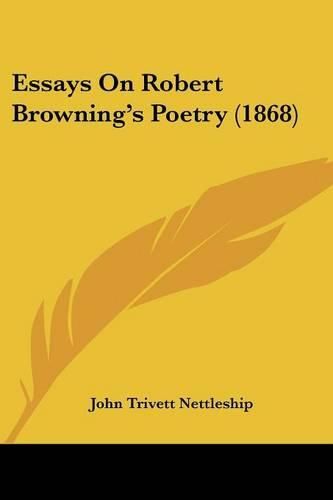Readings Newsletter
Become a Readings Member to make your shopping experience even easier.
Sign in or sign up for free!
You’re not far away from qualifying for FREE standard shipping within Australia
You’ve qualified for FREE standard shipping within Australia
The cart is loading…






Purchase of this book includes free trial access to www.million-books.com where you can read more than a million books for free. This is an OCR edition with typos. Excerpt from book: 79 WARING. IT may seem a paradoxical thing to say, but it is nevertheless true, that all the greatest works of a poet, in the sense of those which have the greatest influence over the thoughts and acts of men, are the works which are most incomplete. Such poems as contain in themselves the complete story or thought which was their life spring (and which are in themselves useful as direct teachings from the master mind in either love, beauty, or knowledge, ) have the merit according to their excellence of lessons to the reader, but they are nothing more. The reader sits in the attitude simply of a listener, a pupil, who takes the thing presented and admires it, and sees it in its completeness, but finds no imperative occasion for use of his own thinking powers further than is necessary to the understanding of the actual poem. He is not compelled to pursue any train of thought of his own. But the incomplete works, those which show that the poet’s mind worked silently up to the point when he could hold his peace no longer, give a far moreserious impetus to the thinking powers of the reader. He feels that a substratum of thought lies beneath, supporting the rough pregnant utterances; that a long train of reflection must have been pursued before the actual words were written down?a train of reflection which he is piqued into finding out for himself by the very incompleteness of the work before him. He feels that the poem is the birth of the poet’s long travail, the very topmost keystone of the arch which he had been building, as it were in secret; nay, that he himself may, by successful interpretation, become in some sense a discoverer. So much for the use of incomplete poems to each individual reader. But in their collective influence, that is, their influence over minds as a wh…
$9.00 standard shipping within Australia
FREE standard shipping within Australia for orders over $100.00
Express & International shipping calculated at checkout
Purchase of this book includes free trial access to www.million-books.com where you can read more than a million books for free. This is an OCR edition with typos. Excerpt from book: 79 WARING. IT may seem a paradoxical thing to say, but it is nevertheless true, that all the greatest works of a poet, in the sense of those which have the greatest influence over the thoughts and acts of men, are the works which are most incomplete. Such poems as contain in themselves the complete story or thought which was their life spring (and which are in themselves useful as direct teachings from the master mind in either love, beauty, or knowledge, ) have the merit according to their excellence of lessons to the reader, but they are nothing more. The reader sits in the attitude simply of a listener, a pupil, who takes the thing presented and admires it, and sees it in its completeness, but finds no imperative occasion for use of his own thinking powers further than is necessary to the understanding of the actual poem. He is not compelled to pursue any train of thought of his own. But the incomplete works, those which show that the poet’s mind worked silently up to the point when he could hold his peace no longer, give a far moreserious impetus to the thinking powers of the reader. He feels that a substratum of thought lies beneath, supporting the rough pregnant utterances; that a long train of reflection must have been pursued before the actual words were written down?a train of reflection which he is piqued into finding out for himself by the very incompleteness of the work before him. He feels that the poem is the birth of the poet’s long travail, the very topmost keystone of the arch which he had been building, as it were in secret; nay, that he himself may, by successful interpretation, become in some sense a discoverer. So much for the use of incomplete poems to each individual reader. But in their collective influence, that is, their influence over minds as a wh…